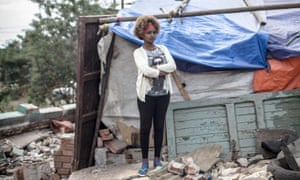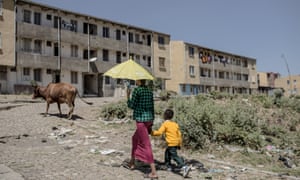“I used to have a small grocery shop right here,” said Selhadin Sulman, spreading his arms wide as he remembered the 25 sq m kebele building that was his home until the police arrived in 2014 and started dismantling it as he slept. He was woken by his neighbours screaming and pleading with them to stop.
Sulman had lived in Wube Berha, part of Addis Ababa’s Piassa historic district, for more than 50 years. Kebele houses were a form of public rental housing built in the 1970s from cheap materials for the Ethiopian capital’s growing number of urban poor.
Sulman pointed to his new dwelling – a rickety structure of mud, straw and wood measuring barely 3 sq m the local police had told him he could stay in as a temporary replacement. He pulled aside a wrinkled curtain and indicated the mud floor where he slept and his belongings piled in the dust.
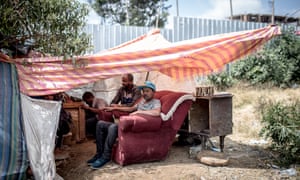
Bahru Nigusa, 40, in his makeshift tent. His childhood home was destroyed in the 2014 demolitions
“To make one person happy, they make 99 others miserable,” he said. “There is no water, no electricity, and you can’t cook inside.”
Just a few days after this conversation, Sulman’s tiny temporary house was demolished. The site right next to the demolished hut is now busy with construction workers building a shopping mall. Sulman has moved to another kebele house in another slum area of the city, while a few of his former neighbours continue to live in makeshift tents strung up amid the rubble of their former houses – for now at least. They complain they have no water or electricity, and have received neither compensation nor an offer of alternative accommodation.
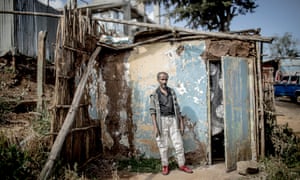
Selhadin Sulman by his makeshift home, which was pulled down just a few days after this photo was taken
Addis Ababa – “new flower” in Amharic – is one of the fastest-growing cities in Africa, with an official population in excess of 4 million, but the true number is likely to be much higher.
Construction sites dot the city, many of them funded by China. Two light rail lines, funded and operated by Chinese companies, were completed in 2015. The city’s Bole international airport is being expanded to three times its size, also funded and built by Beijing. A new Chinese-built 60,000-seat national stadium is under construction, and the Commercial Bank of Ethiopia, the work of the China State Construction Engineering Corporation, will be the tallest building in east Africa when complete.
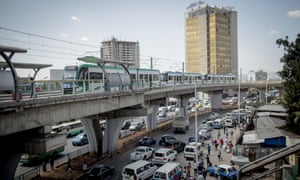
Left: The LRT light rail runs across busy Mexico Square during rush hour. To make room for it, the historic Mexico Square monument was demolished. Right: The African Union building, a gift from China to African countries
According to the local Redevelopment Unit, which manages planning of Piassa, the 2014 demolitions that first made Sulman and his neighbours homeless were part of a larger redevelopment plan to build a light rail station, new malls and condominium buildings.
In total, 800 families in Piassa have been relocated, a representative from the Redevelopment Unit said, but many residents, including Sulman, claim they were not informed in advance of the redevelopment plan or the demolition of their homes.
The Ethiopian government’s response to the housing crisis in Addis since the early 2000s has been to build blocks of apartments, locally known as condominiums. They are built fast and tend to be located on the periphery of the city – far from the kebele residents’ former homes and sources of income.
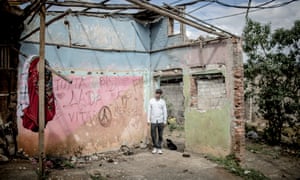
Bahru Nigusa in the ruins of his childhood home: ‘There was so much social life in this neighbourhood. Many great singers used to live here. Those who have moved to the condominium, they cannot get used to their new life’
“Before condominiums, 80% of the inner city was informal settlements,” says Metadel Sileshi, a researcher and lecturer at the Ethiopian Institute of Architecture, Building Construction and City Development. “There has been a mass movement from the inner city to the periphery.”
The condominium units are beyond the reach of many. They are awarded according to a lottery scheme that requires “winners” to pay hefty deposits and sign up to an extended repayment term. In many cases, “winners” from lower-income groups have to give up their lottery condominium because they cannot afford the down payment.

The Yeka Abado condominium complex where Wube Berha residents were asked to relocate. Right: Inside a condominium apartment in Lideta, Addis Ababa
In Wube Berha, evicted local residents have been asked to relocate to the Yeka Abado condominium complex, a three-year-old site containing more than 18,000 flats on the edge of the city. They were promised an automatic “win” in the condominium lottery as long as they paid a 20% down payment of approximately 70,000 birr (nearly 1,860), with a monthly mortgage of around 2,000 birr (£53). It is too expensive for most of the former residents, and relocating to the periphery would mean a loss of income for those who make ends meet doing menial jobs in the centre of the city.
Six of Sulman’s former neighbours remain in tents in Wube Berha. “They told us to find another place to rent, but we don’t have money,” says one, Bahru Nigusa. “We will continue to stay here. They have not given us any solutions.”
Additional reporting by Abel Asrat

